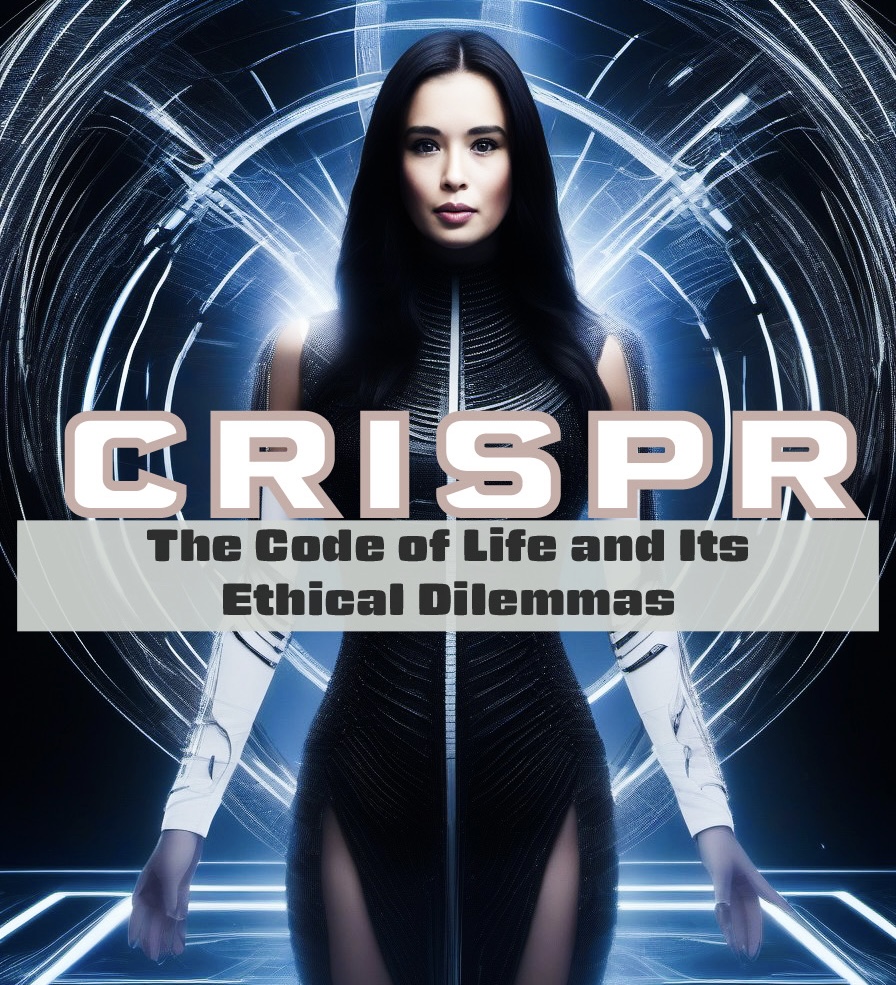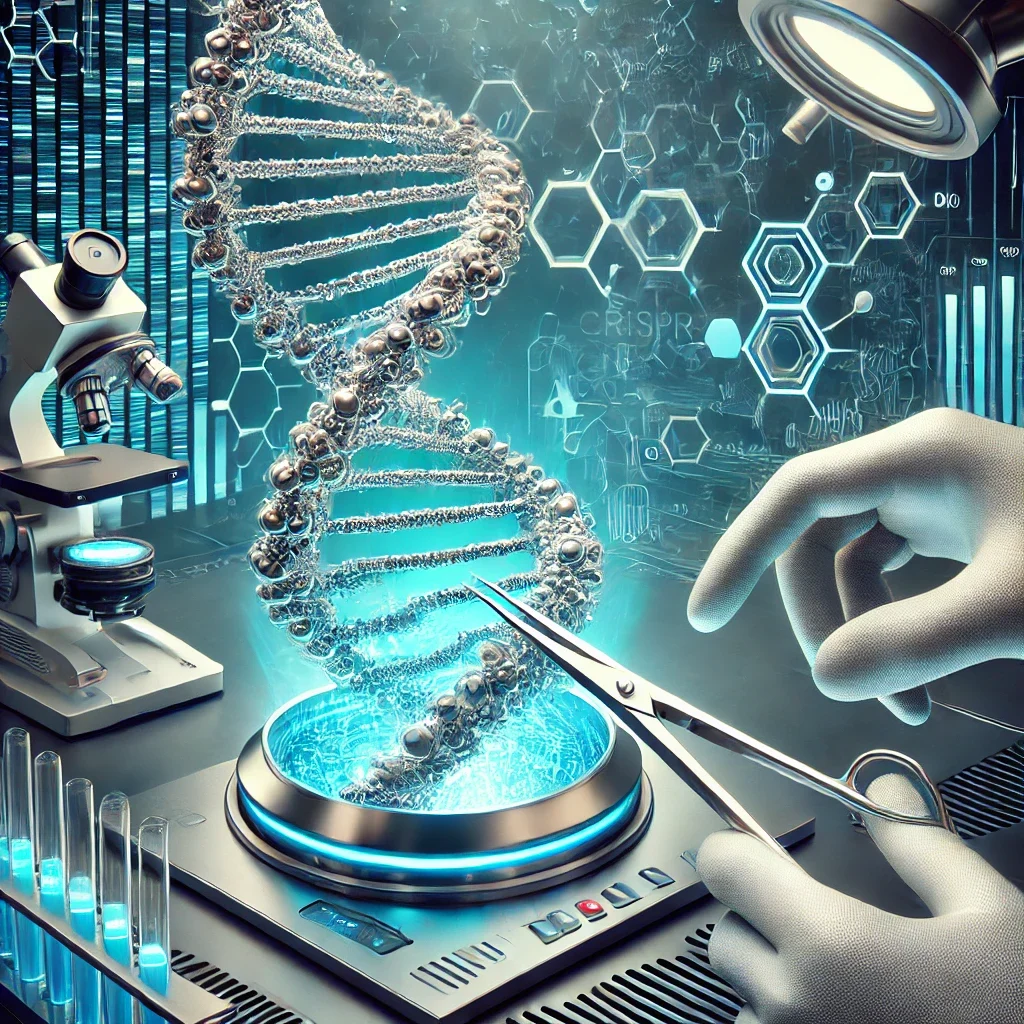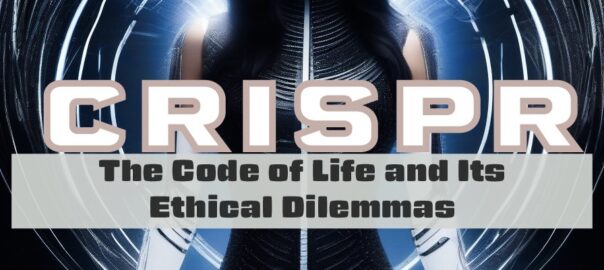After a long day at work, I finally settled into my chair, allowing the events of the day to gradually fade into the background. As I sat there, enjoying the quiet and letting my mind wander, I suddenly found myself thinking about something I had read earlier—a piece on CRISPR, the gene-editing technology that has been making headlines. The thought struck me: we are living in a time where the once unimaginable is becoming reality. The ability to edit DNA, to potentially cure genetic diseases, to shape the future of humanity with such precision, is no longer just the domain of science fiction.
In the stillness of that moment, I began to contemplate the implications of CRISPR. How did we get here? What does it mean for us as individuals, and for society as a whole, to have the power to rewrite the very code of life? The more I thought about it, the more I realized the profound impact this technology could have—not just in curing diseases, but in transforming the way we live and interact with the world. But with such power also comes immense responsibility, and the need to carefully consider the ethical and moral questions that CRISPR raises.
These reflections led me to delve deeper into the topic, exploring the latest breakthroughs in CRISPR technology, the challenges that lie ahead, and the ethical dilemmas we must face as we navigate this new frontier in genetic engineering. What follows is an exploration of these themes, inspired by that moment of quiet contemplation after a long day.

Understanding CRISPR: A Brief Overview
CRISPR is a tool that enables scientists to make specific, targeted changes to the DNA of living organisms. It was originally discovered as a natural defense mechanism used by bacteria to fend off viral infections. Scientists have since adapted this system to allow for precise cutting and modification of DNA in a wide range of organisms, including humans.

The CRISPR system operates through a combination of a guide RNA, which locates the specific DNA sequence to be edited, and the Cas9 protein, which acts as molecular scissors to cut the DNA at the targeted location. This process can be used to delete, insert, or modify genetic material, opening up new possibilities for genetic research and therapy.
Recent Breakthroughs in CRISPR Technology

Advances in Gene Therapy
One of the most promising applications of CRISPR technology is in the realm of gene therapy. Recent clinical trials have demonstrated the ability of CRISPR to treat genetic disorders that were once considered incurable. For example, in 2020, researchers successfully treated patients with sickle cell anemia, a severe and painful genetic condition, by using CRISPR to correct the defective gene responsible for the disease. This breakthrough offers hope to millions of people suffering from genetic disorders worldwide.
Another significant development has been the use of CRISPR to address congenital blindness. In groundbreaking trials, scientists have edited the genes of patients to restore partial vision, marking a major milestone in the field of ophthalmology and genetic medicine.
Transforming Agriculture
CRISPR is also making its mark in agriculture, where it is being used to develop crops that are more resilient to environmental stresses such as drought, pests, and diseases. For instance, researchers have engineered a variety of wheat that is resistant to powdery mildew, a fungal disease that poses a major threat to global wheat production. By precisely altering the genes that make the wheat vulnerable to the disease, scientists have created a more robust and sustainable crop.
In addition to disease resistance, CRISPR is being employed to enhance the nutritional content of crops. A notable example is the development of “Golden Rice,” a genetically modified rice variety that has been enriched with beta-carotene, a precursor to vitamin A. This innovation could play a critical role in combating vitamin A deficiency in regions where rice is a staple food.

Beyond Humans and Crops
CRISPR’s applications extend far beyond human medicine and agriculture. One of the most innovative uses of CRISPR is in controlling the spread of infectious diseases. Researchers have modified the genes of mosquitoes to make them less capable of transmitting diseases such as malaria, dengue, and Zika virus. This approach has the potential to save millions of lives, particularly in tropical regions where these diseases are endemic.
Additionally, there are ongoing efforts to use CRISPR in conservation biology, including the ambitious project to bring back extinct species such as the woolly mammoth. While still in the experimental stage, these efforts highlight the vast potential of CRISPR to not only alter living species but to reshape ecosystems as well.

Ethical Considerations and Controversies
The Debate Over Human Germline Editing
One of the most contentious aspects of CRISPR technology is its use in editing human embryos, a practice known as germline editing. This process involves making changes to the DNA of an embryo, which can then be passed on to future generations. In 2018, the scientific community was rocked by the news that a Chinese researcher had used CRISPR to edit the genomes of twin girls to make them resistant to HIV. This experiment was met with widespread condemnation due to the potential for unforeseen consequences and the ethical implications of altering human DNA in such a fundamental way.
The concept of “designer babies”—where parents could theoretically choose traits such as intelligence, physical appearance, or athletic ability—has sparked a global debate. While CRISPR offers the potential to eliminate genetic diseases, it also raises the specter of eugenics and the possibility of creating a society where genetic enhancements could exacerbate social inequalities.
Impact on Biodiversity and Ecosystems
CRISPR’s use in the environment also presents significant ethical and ecological challenges. For example, editing the genes of mosquitoes to reduce their ability to spread malaria could have far-reaching effects on ecosystems. Mosquitoes are a key part of many food webs, and their reduction could impact species that rely on them for food, potentially leading to unintended ecological consequences.
Similarly, the widespread use of CRISPR in agriculture could lead to reduced biodiversity, as genetically modified crops may outcompete wild varieties, leading to a loss of genetic diversity that is crucial for resilience in changing environments.

The Need for Global Regulation
As CRISPR technology continues to evolve, there is a growing consensus on the need for comprehensive regulations to govern its use. Currently, different countries have adopted varying approaches, with some allowing gene editing under strict conditions and others imposing outright bans. The lack of a unified global framework makes it challenging to address the ethical and safety concerns associated with CRISPR.
International organizations, such as the World Health Organization (WHO), have called for the establishment of global guidelines to ensure that CRISPR is used responsibly. However, the rapid pace of scientific advancement poses a challenge to regulators, who must balance the potential benefits of CRISPR with the risks it presents.

The Future of CRISPR
Ongoing Research and Innovation
The future of CRISPR is filled with possibilities. Researchers are continuously working to refine the technology, improving its accuracy and reducing the risk of off-target effects—where unintended parts of the genome are edited. These advancements could make CRISPR even safer and more effective, paving the way for its broader application in medicine and other fields.
In addition to improving the technology itself, scientists are exploring new applications for CRISPR. For instance, there is ongoing research into using CRISPR to combat viral infections, including potential applications in managing pandemics. This could involve editing the genes of viruses to render them harmless or developing novel treatments that target viral DNA.
Potential for Personalized Medicine
Looking ahead, CRISPR has the potential to revolutionize personalized medicine. By tailoring genetic edits to an individual’s unique DNA, doctors could develop treatments that are specifically designed to address that person’s genetic makeup. This approach could lead to more effective therapies with fewer side effects, particularly in the treatment of complex diseases such as cancer.
There is also speculation about the potential for CRISPR to be used in anti-aging research, with some scientists exploring the possibility of extending human lifespan by editing genes associated with aging. While these ideas are still in their infancy, they highlight the transformative potential of CRISPR.
Public Engagement and Ethical Responsibility
As with any powerful technology, public perception and ethical responsibility will play crucial roles in determining the future of CRISPR. There is a pressing need for greater public engagement and education to ensure that the benefits and risks of CRISPR are widely understood. Involving the public in discussions about the ethical implications of CRISPR can help guide its development in a way that aligns with societal values and priorities.

Conclusion
CRISPR is a groundbreaking technology with the potential to reshape the world in ways that were once the stuff of science fiction. From curing genetic diseases to revolutionizing agriculture and even altering ecosystems, the possibilities are vast. However, with this power comes the responsibility to navigate the ethical challenges that CRISPR presents.
As we stand on the brink of this new era in genetics, it is essential that we approach CRISPR with both excitement and caution. The choices we make today will determine whether CRISPR becomes a force for good or a source of unintended harm. By fostering an informed and inclusive dialogue about the future of CRISPR, we can ensure that this remarkable technology is used to benefit humanity and the planet.
References:
1. Jinek, M., Chylinski, K., Fonfara, I., Hauer, M., Doudna, J. A., & Charpentier, E. (2012). “A Programmable Dual-RNA–Guided DNA Endonuclease in Adaptive Bacterial Immunity.” Science, 337(6096), 816-821. DOI: 10.1126/science.1225829
2. Doudna, J. A., & Charpentier, E. (2014). “The new frontier of genome engineering with CRISPR-Cas9.” Science, 346(6213). DOI: 10.1126/science.1258096
3. Zhang, F., Wen, Y., & Guo, X. (2014). “CRISPR/Cas9 for genome editing: progress, implications and challenges.” Human Molecular Genetics, 23(R1), R40-R46. DOI: 10.1093/hmg/ddu125
4. Hsu, P. D., Lander, E. S., & Zhang, F. (2014). “Development and Applications of CRISPR-Cas9 for Genome Engineering.” Cell, 157(6), 1262-1278. DOI: 10.1016/j.cell.2014.05.010
5. Cyranoski, D. (2019). “The CRISPR-baby scandal: what’s next for human gene-editing.” Nature, 566, 440-442. DOI: 10.1038/d41586-019-00673-1
6. Ledford, H. (2015). “CRISPR, the disruptor.” Nature, 522, 20-24. DOI: 10.1038/522020a
7. Regalado, A. (2019). “Excessive, unregulated editing is breeding monsters in the lab.” MIT Technology Review. Retrieved from MIT Technology Review

